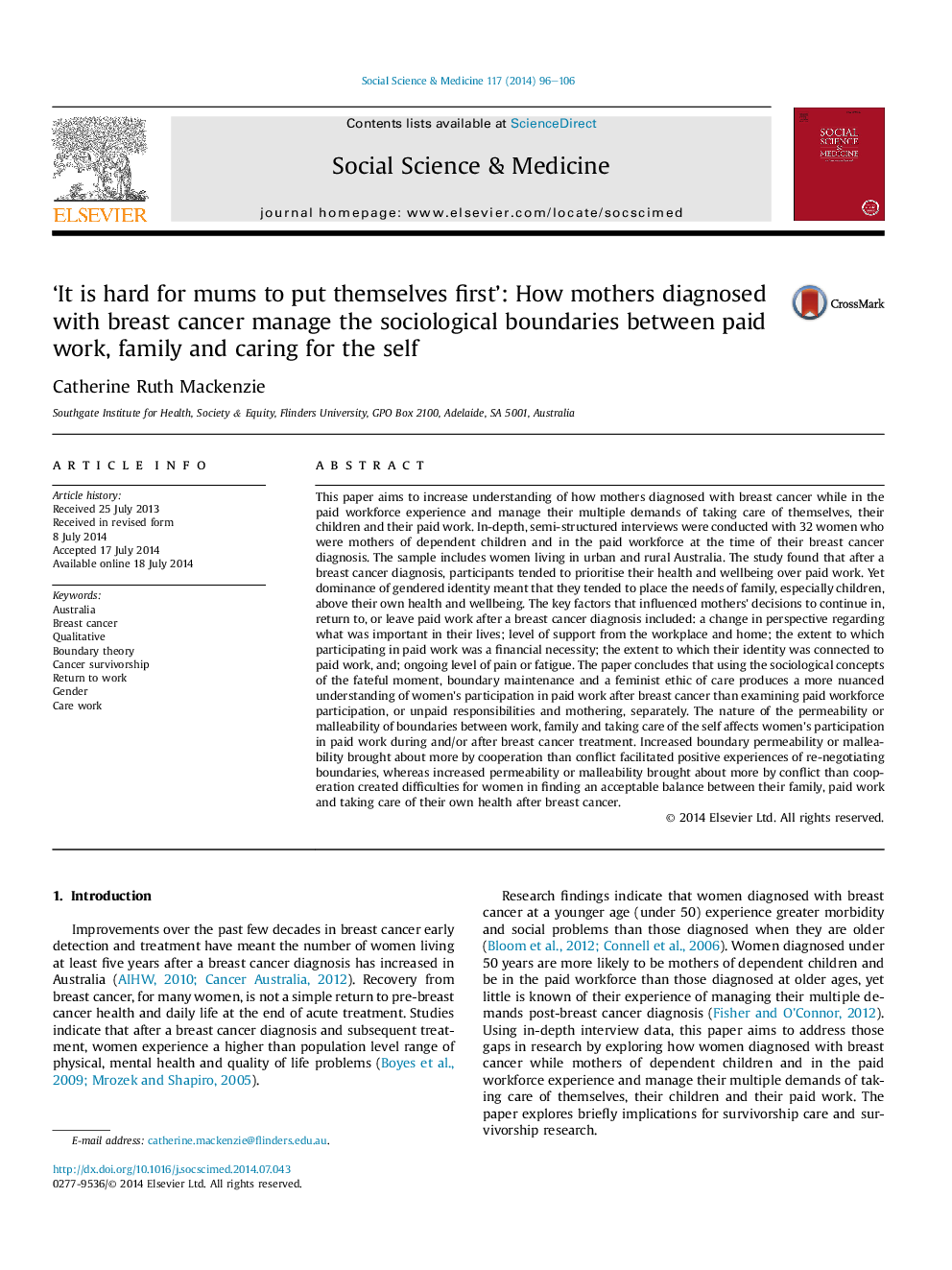| کد مقاله | کد نشریه | سال انتشار | مقاله انگلیسی | نسخه تمام متن |
|---|---|---|---|---|
| 7334669 | 1476051 | 2014 | 11 صفحه PDF | دانلود رایگان |
عنوان انگلیسی مقاله ISI
'It is hard for mums to put themselves first': How mothers diagnosed with breast cancer manage the sociological boundaries between paid work, family and caring for the self
ترجمه فارسی عنوان
"برای ما مهم است که برای اولین بار خود را قرار دهیم": چگونه مادران مبتلا به سرطان سینه تشخیص می دهند مرزهای جامعه شناختی بین کار پرداخت شده، خانواده و مراقبت از خود
دانلود مقاله + سفارش ترجمه
دانلود مقاله ISI انگلیسی
رایگان برای ایرانیان
کلمات کلیدی
استرالیا، سرطان پستان، کیفی نظریه مرزی، زنده ماندن سرطان، بازگشت به کار، جنسیت، کار مراقبت،
ترجمه چکیده
این مقاله با هدف افزایش درک اینکه چگونه مادران مبتلا به سرطان سینه تشخیص داده می شوند در حالی که در کار نیروی کار مشغول به کار هستند و خواسته های متعدد خود را برای مراقبت از خود، فرزندان خود و کار پرداخت شده خود را مدیریت می کنند. مصاحبه های نیمه ساخت یافته با 32 نفر از زنان که در زمان تشخیص سرطان پستان آنها مادران فرزندان وابسته و نیروی کار بود، انجام شد. نمونه شامل زنانی است که در استرالیا شهری و روستایی زندگی می کنند. این تحقیق نشان داد که پس از تشخیص سرطان پستان، شرکت کنندگان تمایل داشتند تا سلامت و سلامت آنها را بیش از کار پرداخت شده تعیین کنند. با این حال، تسلط بر هویت جنسیتی به این معنی بود که آنها تمایل داشتند که نیازهای خانواده، به ویژه کودکان، بالاتر از سلامت و سلامت خودشان باشد. عوامل کلیدی که بر تصمیمات مادران برای ادامه کار، بازگشت به کار یا ترک کار پس از تشخیص سرطان پستان تأثیر می گذارند عبارتند از: تغییر در دیدگاه در مورد آنچه که در زندگی آنها مهم بود؛ سطح حمایت از محل کار و خانه؛ میزان مشارکت در کار پرداخت شده، ضرورت مالی بود؛ تا چه حد هویت آنها به کار پرداخت شده متصل بود؛ و؛ سطح فعلی درد یا خستگی. این مقاله نتیجه گیری می کند که استفاده از مفاهیم جامعه شناختی لحظه های سرنوشت ساز، نگهداری مرزی و اخلاق فمینیستی مراقبت باعث می شود درک مشارکت زنان در کار پرداخت شده پس از سرطان پستان نسبت به بررسی مشارکت نیروی کار مشمول، و یا مسئولیت های پرداخت نشده و مادران جداگانه. ماهیت نفوذپذیری یا تنفس مرزها بین کار، خانواده و مراقبت از خود بر مشارکت زنان در کار پرداخت شده در طی و / یا بعد از درمان سرطان تاثیر می گذارد. افزایش نفوذپذیری مرزها یا تسلیم شدن از طریق همکاری بیش از منافع موجب شد تا تجربیات مثبت مرزهای مجدد مذاکره را تسهیل کند، در حالیکه نفوذ پذیری یا نفوذپذیری بیشتر باعث شد تا منازعات بیشتر از همکاری ایجاد شود، مشکلات زنان برای یافتن تعادل مناسب میان خانواده، کار و کار مراقبت از سلامتی خود را پس از سرطان پستان.
موضوعات مرتبط
علوم پزشکی و سلامت
پزشکی و دندانپزشکی
سیاست های بهداشت و سلامت عمومی
چکیده انگلیسی
This paper aims to increase understanding of how mothers diagnosed with breast cancer while in the paid workforce experience and manage their multiple demands of taking care of themselves, their children and their paid work. In-depth, semi-structured interviews were conducted with 32 women who were mothers of dependent children and in the paid workforce at the time of their breast cancer diagnosis. The sample includes women living in urban and rural Australia. The study found that after a breast cancer diagnosis, participants tended to prioritise their health and wellbeing over paid work. Yet dominance of gendered identity meant that they tended to place the needs of family, especially children, above their own health and wellbeing. The key factors that influenced mothers' decisions to continue in, return to, or leave paid work after a breast cancer diagnosis included: a change in perspective regarding what was important in their lives; level of support from the workplace and home; the extent to which participating in paid work was a financial necessity; the extent to which their identity was connected to paid work, and; ongoing level of pain or fatigue. The paper concludes that using the sociological concepts of the fateful moment, boundary maintenance and a feminist ethic of care produces a more nuanced understanding of women's participation in paid work after breast cancer than examining paid workforce participation, or unpaid responsibilities and mothering, separately. The nature of the permeability or malleability of boundaries between work, family and taking care of the self affects women's participation in paid work during and/or after breast cancer treatment. Increased boundary permeability or malleability brought about more by cooperation than conflict facilitated positive experiences of re-negotiating boundaries, whereas increased permeability or malleability brought about more by conflict than cooperation created difficulties for women in finding an acceptable balance between their family, paid work and taking care of their own health after breast cancer.
ناشر
Database: Elsevier - ScienceDirect (ساینس دایرکت)
Journal: Social Science & Medicine - Volume 117, September 2014, Pages 96-106
Journal: Social Science & Medicine - Volume 117, September 2014, Pages 96-106
نویسندگان
Catherine Ruth Mackenzie,
